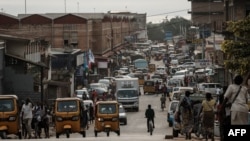The "staff-level agreement" for a 40-month credit facility for the poverty-stricken central African nation followed a visit by an IMF team to Burundi's economic capital Bujumbura in February.
It aims to "support a push to restore external sustainability, strengthen debt sustainability, while supporting economic recovery from shocks and creating fiscal space for accelerated and inclusive growth," the IMF said in statement late Monday.
The facility, the first since 2015, still requires the approval of IMF management, it added.
Burundi has been suffering economic malaise since a deadly political crisis in 2015, with a lack of foreign exchange and shortages of basic goods.
The crisis in the country, where farming forms the backbone of the economy, has been exacerbated by the COVID-19 pandemic and the Ukraine war.
Real GDP growth is estimated to have slowed to 1.8 percent last year from 3.1 percent in 2021, the IMF said, but is projected to rebound to 3.3 percent this year.
Inflation meanwhile was running at an average of 18.9 percent last year and at 28.6 percent year-on-year at the end of January, driven by food prices, the fund said.
"It is projected to remain high, at around 18 percent in 2023."
Despite concerns about Burundi's rights record, both the European Union and the United States last year resumed aid flows, citing political progress under President Evariste Ndayishimiye.
Ndayishimiye has been praised for slowly ending years of Burundi's isolationism under former leader Pierre Nkurunziza's chaotic and bloody rule.
But he has failed to improve its wretched record on human rights, and the African Great Lakes nation of 12 million people remains the poorest on the planet according to World Bank data.







